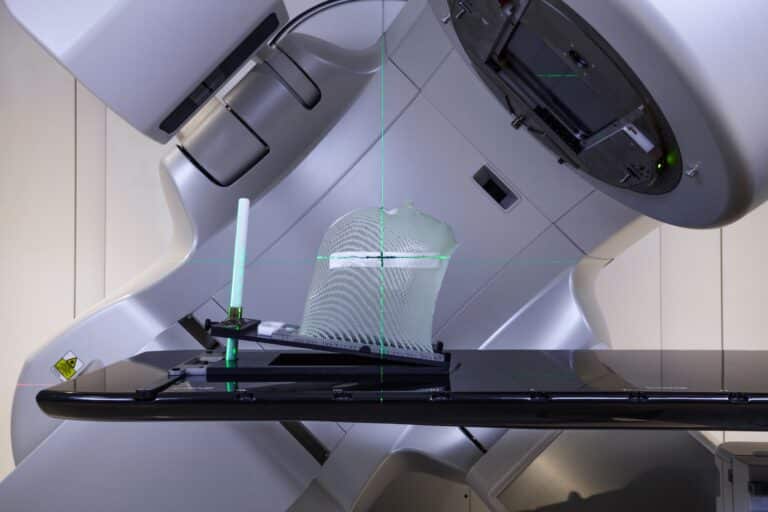
Michael Joe Cini
9th March 2023
Israeli Biotechnology Company Alpha TAU Develops New Cancer Treatment Using Alpha Particles
Israeli company Alpha Tau Medical has developed Alpha DaRT, a new cancer treatment that uses alpha particles to directly attack cancerous tissue. The company has developed dedicated applicators and modified existing biopsy devices to make the implantation of Alpha DaRT sources easy for clinicians. The treatment is showing promise as a faster and more efficient method of cancer treatment and has received approval from Israel’s health ministry.
Safer cancer treatment: How Alpha TAU is pioneering precision radiotherapy with Alpha DaRT
A critical aspect of implementing new medical technology is how easily clinicians can adopt the latest technologies. To make the implantation of Alpha DaRT sources easy, Alpha TAU developed dedicated applicators and modified existing biopsy devices. Physicians are already acquainted with these devices, and the workflow is very similar to a biopsy, making it possible for surgeons to familiarise themselves with Alpha DaRT implantation in a very short time.

Alpha sources can then be implanted into cancer cells, directly attacking cancerous tissue. Due to the different natures of healthy and cancerous tissue, emitted alpha particles can diffuse about five millimetres into tumours, as against only 1 millimetre in healthy tissue. For custom tumour treatment, special software takes DICOM images from CT scanners. The software helps clinicians create a treatment plan and define the distribution of Alpha DRT sources within the tumour.
In addition, Alpha DRT is showing promise to be a faster and more efficient method of cancer treatment. The technology was taken to clinical trials around the COVID pandemic when patients wanted to spend less time at hospitals. Patients who received the treatment only spent a couple of hours and required a single visit for the treatment, as compared to traditional radiotherapy or surgery, which requires several hours and multiple visits. Also, initial trials in Israel and the USA showed 78% and 100% complete responses (no residual tumour tissue), respectively. Studies have furthermore shown that Alpha DRT can help patients develop immunity to targeted cancer types.
Currently, the company is aggressively working to make its product regulation-compliant and market-ready, with a pivotal multi-centre study in 20 sites across the US on the cards, as well as plans to expand to other geographic regions in Europe and Japan. In Israel, Alpha TAU has already received approval to treat patients from the health ministry, and its upcoming multi-centre study in the US is expected to facilitate FDA approval of the product.
Origins of a New Technology: The Birth of Alpha DaRT
Undeterred by the well-known factors of radiotherapy, Professor Itzhak Kelson, at the time the head of the Physics department at Tel Aviv University, explored the possibility of using alpha particles to treat tumours together with co-inventor Professor Yona Keisari. As early as 2009, one of their first papers explores the effects of diffusing alpha-emitter radiation therapy together with a chemotherapeutic agent on tumour development in rats. Both “local tumour growth and metastatic spread” were reduced, indicating a possible positive utility for the technique in medicine.
Their studies resulted in a new technology known as Alpha DaRT (diffusing alpha-emitter radiation therapy), comprising stainless-steel cylinders seeded with radium-224 atoms. In its decay, radium-224 releases alpha particles that can travel up to 50 microns in biological tissue. While that is only a small distance, the “ace up the sleeve” of this technology is that the decay products of radium-224, such as radon-220 and polonium-216, are able to diffuse up to several millimetres within the tissue, expanding the effective range of this procedure.
While it was demonstrably effective, the development and implementation of Alpha DaRT in medicine took a lot of work. In the 2010s, Althera Medical Ltd., an Israeli biotechnology company with its headquarters co-located in Harlem, New York and Tel Aviv, Israel, was selected to facilitate the development and finetuning of DaRT for use in human medicine. By 2011, it was already working on human trials for the technology at the eminent Rabin Medical Institute in Petah Tikva, Israel. However, restricted by an inability to fund clinical trials, Althera folded before the product could be commercially ready. Alpha TAU, founded in 2015 by Uzi Sofer, the successful former CEO of Brainsway, took the baton from Althera. Ever since. Alpha TAU has been pushing the Alpha DaRT technology from strength to strength.
In 2022, Alpha TAU went public on the NASDAQ, raising about $100 million in funding from new shareholders. Alpha TAU has also successfully developed Alpha DaRT into a product and has organized its manufacturing process at its headquarters in Jerusalem. To obtain radium-224, the company sources thorium-228 from Oak Ridge National Laboratory, US, and then extracts radium-224 from thorium decay. Radium-224 is then impregnated into steel rods which are then packaged into a custom kit for treating specific tumours. The custom steel rods serve as sources of alpha particles, and when implanted into a tumour can produce radiation which penetrates up to five millimetres in tumours.
History of radiotherapy
Radiation therapy, or radiotherapy, is a standard procedure for treating tumours. Typically, radiotherapists use devices that emit gamma rays, a type of electromagnetic radiation, to kill tumours. These devices are located outside the body and penetrate (and damage) healthy tissues in order to reach the tumour. Gamma rays have been popularly used in clinical radiotherapy because of their extensive range, enabling them to deliver damage to deep-seated cancerous masses.
However, the imprecise nature of gamma-ray delivery to tumours also leads to significant damage to healthy tissues, often resulting in poor outcomes. In addition, while powerful and dangerous, gamma radiation has the least ionizing power of the three most common types of radiation emitted from radioactive substances. This reduces their efficacy in killing tumours.
On the other hand, alpha particles have greater ionizing power and ability to damage tissue, suggesting greater efficacy. However, their use in radiotherapy has been limited due to their short effective range – according to the New Jersey Department of Health and Senior Services, alpha particles are unable to penetrate intact skin, only causing damage when inside the body.
Aptly put by Gali Weinreb in a 2016 article in Israel’s Globe Newspaper, “Alpha particles can travel only about 1-2 microns, millionths of a centimetre, in tissue. This is advantageous because the damage it performs is focused in one place, only in the tumour. But this is also a disadvantage, because it was clear, to all scientists before Professor Kelson did the impossible, that the alpha particles could not travel far enough to move around and damage a whole cancer tumor.”






